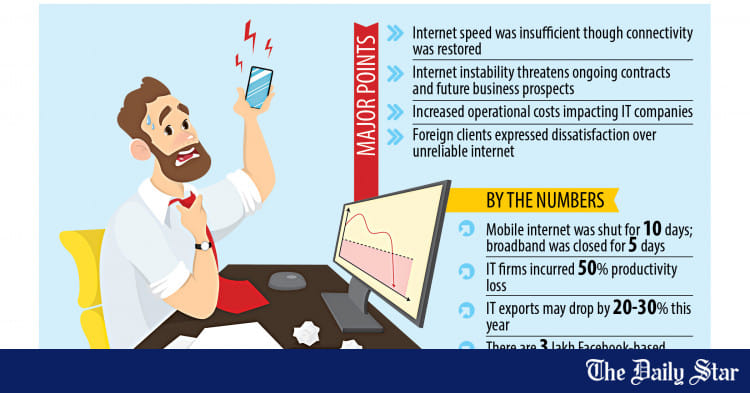Saif
Senior Member
- Messages
- 17,462
- Likes
- 8,403
- Nation

- Residence

- Axis Group


IT cos fear foreign clients may turn their back on them
Internet blackout came as a severe blow to the IT companies that fear long-term setbacks on business if foreign clients consider them unreliable and move to other countries, say Vietnam, for uninterrupted services. To avoid clients get irked by any disruption, some big companies have even sent a s
IT cos fear foreign clients may turn their back on them
MOHAMMAD MUFAZZEL
Published :
Jul 28, 2024 08:56
Updated :
Jul 28, 2024 09:35

Internet blackout came as a severe blow to the IT companies that fear long-term setbacks on business if foreign clients consider them unreliable and move to other countries, say Vietnam, for uninterrupted services.
To avoid clients get irked by any disruption, some big companies have even sent a small team of their workforce to any neighbouring country, for example Nepal and Singapore, to ensure continuation of their services.
Meanwhile, telecom operators said their daily revenue from data services was slashed by 35 per cent and that the industry incurred a loss of around Tk 5 billion between July 16 and July 26. Many service centres were also vandalized during the mayhem centring on protests against the quota system in government jobs, adding to the loss.
Local IT companies have experienced a boom in business opportunities in recent years as they have seen more and more overseas clients seeking to outsource back-office operations, customer care, image processing, graphics design, data entry, data analysis etc. That gave rise to optimistic projections about export growth of IT-enabled products and services.
The sector constitutes 1.25 per cent of the GDP (gross domestic product) and its export earnings were reportedly above $1.8 billion in the last fiscal year.
Shameem Ahsan, managing director of listed IT company eGeneration, said the shutdown of the Internet put the country in reverse order regarding the expansion of the global footprint of the IT sector.
"Companies, which provide outsourced services, lost a large number of foreign clients who failed to communicate with them," he said.
Losses in revenue amounted to Tk 5 billion in the five days to Thursday last week, according to the Bangladesh Association of Software and Information Services (BASIS). The decline in income from the local segment is yet to be determined.
About 5 per cent of 2,500 IT companies sent small teams abroad in a desperate attempt to keep services to foreign clients unhindered during the Internet blackout.
"Foreign clients have alternatives to get the services. So, they will not wait for a service provider to get back to them," said BASIS President Russell T Ahmed.
Though Internet connections have been restored, Mr Ahmed said the companies were yet to return to operations fully because of the low speed.
Mr. Ahsan said his small company eGeneration itself lost revenue worth around Tk 15 million in the last one week. "It would take time to regain the confidence of foreign clients who seek services from Bangladeshi companies."
Mobile operators also endured losses for data services being snapped. A significant amount of revenue is generated from services to corporate companies and SME sectors.
The impact of the disruptions can be illustrated by the experiences that any of the service recipients were subjected to.
A senior official of Square Pharmaceuticals says the drug maker usually receives around 30,000 invoices from buyers across the country. The buyers send invoices to the company's depots situated in different districts through mobile Internet. Now they need to go to the depots and physically submit the invoices.
As a result, the number of invoices received per day has almost halved.
The companies that stored data through cloud computing have encountered greater problems.
App-based operations of mobile operators have also remained suspended. Company secretary of Robi Axiata Mohammed Shahedul Alam said telecom operators earn good revenue from the use of YouTube and Facebook.
"Our new customer acquisition also remained halted during the period of the unrest," Mr. Alam said.
Telecom operators, however, hope to recover part of the loss from the increase in voice services.
The recovery will depend on the facilities to be provided by the government, added Mr. Alam.
MOHAMMAD MUFAZZEL
Published :
Jul 28, 2024 08:56
Updated :
Jul 28, 2024 09:35
Internet blackout came as a severe blow to the IT companies that fear long-term setbacks on business if foreign clients consider them unreliable and move to other countries, say Vietnam, for uninterrupted services.
To avoid clients get irked by any disruption, some big companies have even sent a small team of their workforce to any neighbouring country, for example Nepal and Singapore, to ensure continuation of their services.
Meanwhile, telecom operators said their daily revenue from data services was slashed by 35 per cent and that the industry incurred a loss of around Tk 5 billion between July 16 and July 26. Many service centres were also vandalized during the mayhem centring on protests against the quota system in government jobs, adding to the loss.
Local IT companies have experienced a boom in business opportunities in recent years as they have seen more and more overseas clients seeking to outsource back-office operations, customer care, image processing, graphics design, data entry, data analysis etc. That gave rise to optimistic projections about export growth of IT-enabled products and services.
The sector constitutes 1.25 per cent of the GDP (gross domestic product) and its export earnings were reportedly above $1.8 billion in the last fiscal year.
Shameem Ahsan, managing director of listed IT company eGeneration, said the shutdown of the Internet put the country in reverse order regarding the expansion of the global footprint of the IT sector.
"Companies, which provide outsourced services, lost a large number of foreign clients who failed to communicate with them," he said.
Losses in revenue amounted to Tk 5 billion in the five days to Thursday last week, according to the Bangladesh Association of Software and Information Services (BASIS). The decline in income from the local segment is yet to be determined.
About 5 per cent of 2,500 IT companies sent small teams abroad in a desperate attempt to keep services to foreign clients unhindered during the Internet blackout.
"Foreign clients have alternatives to get the services. So, they will not wait for a service provider to get back to them," said BASIS President Russell T Ahmed.
Though Internet connections have been restored, Mr Ahmed said the companies were yet to return to operations fully because of the low speed.
Mr. Ahsan said his small company eGeneration itself lost revenue worth around Tk 15 million in the last one week. "It would take time to regain the confidence of foreign clients who seek services from Bangladeshi companies."
Mobile operators also endured losses for data services being snapped. A significant amount of revenue is generated from services to corporate companies and SME sectors.
The impact of the disruptions can be illustrated by the experiences that any of the service recipients were subjected to.
A senior official of Square Pharmaceuticals says the drug maker usually receives around 30,000 invoices from buyers across the country. The buyers send invoices to the company's depots situated in different districts through mobile Internet. Now they need to go to the depots and physically submit the invoices.
As a result, the number of invoices received per day has almost halved.
The companies that stored data through cloud computing have encountered greater problems.
App-based operations of mobile operators have also remained suspended. Company secretary of Robi Axiata Mohammed Shahedul Alam said telecom operators earn good revenue from the use of YouTube and Facebook.
"Our new customer acquisition also remained halted during the period of the unrest," Mr. Alam said.
Telecom operators, however, hope to recover part of the loss from the increase in voice services.
The recovery will depend on the facilities to be provided by the government, added Mr. Alam.






